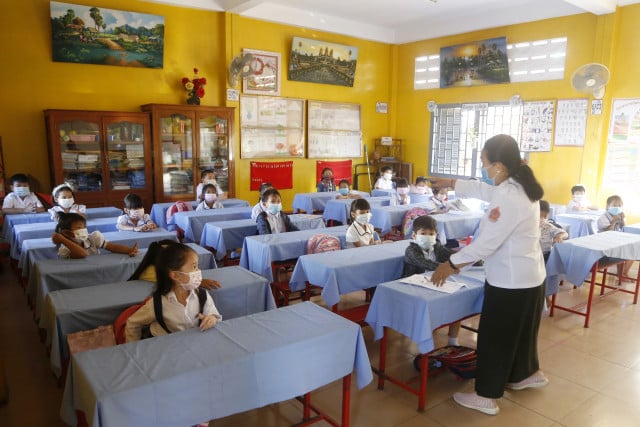Opinion: Factors to Consider Education Reforms in Cambodia

- Em Sereyrath
- May 4, 2021 12:55 PM
While the problems facing Cambodia’s education system are multifaceted, the quality of teaching is key and for this, Em Sereyrath argues that there are three key areas that can be addressed.
The teacher is at the heart of education, without them, the learning process comes to a standstill. Many factors come into play when we look at what makes successful education reforms in Cambodia, but teachers are where the focus must lie.
As such, to improve the quality of education first the issue of teaching quality must be addressed, which is somewhat dependent on teachers’ quality of life, but also on upholding the quality of teaching through regular school inspections.
A decent monthly wage is essential to ensuring that teachers can focus on their work and prepare high quality lessons. Article 13 of the 20018 sub-decree on Teachers’ Professional Ethics states that teachers must not have two jobs, but many educators still need to take on extra work to generate enough money to support their families.
Working as a teacher by day and a motor-taxi driver by night, teachers are struggling to provide for their families—who doesn’t want their wife or husband and their children to eat well?
Article 8 of the same sub-decree also states that teachers must prepare lesson plans before lessons in order to ensure the quality of the education provided. Lesson planning is time-consuming and cannot be done properly if teachers are busy working extra jobs outside of the classroom.
While money to support a family is one thing, being respected and appreciated by the public is another and the Ministry of Education, Youth and Sport should help promote the value of educators among the public. It’s true that most people do respect teachers, but often they are looked down upon because of their low salaries and so increasing the quality of life for teachers will increase their social standings and thus attract more people to the education profession.
Importantly, there are already many teachers working without the correct qualifications to work as an educator in contemporary Cambodia. Some have no high school diploma, others dropped out of school at Grade 9. These teachers should have their skills upgraded by the Education Ministry, whether through workshops, seminars or professional development courses.
This was attempted, but only in a three-batch program that ran from 2016 until 2019—professional development should be ongoing. If the Education Ministry provides teachers with these opportunities, they will be able to share their experiences with other teachers as well as develop new skills for the classroom.
For the future, teachers should hold at least a Bachelor’s degree before being trained as teachers as the quality of education a teacher can offer depends on both their specialized knowledge and their ability to share that knowledge in an engaging way with students, not to mention all of the professional ethics that need to be taught to prospective teachers.
If the Education Ministry recruits teachers based on these principles, education reform will happen much, much faster and the quality of education will improve from within.
However, it is impossible to ignore the fact that teaching is a difficult and strenuous job. Even the best-trained among us can be worn down by the low pay and conditions, others can simply lose their passion or feel like they can’t make a difference.
In short, school inspections held by competent authorities are essential to ensuring that the pursuit of improvement in education continues marching forwards. Inspectors will need to be trained by the Education Ministry to observe and assess teachers, but most importantly, they need to be able to communicate with teachers so that they know how to improve.
School inspections should be an assessment of the quality of education offered at each school. There are many schools where teachers have worked for too long and have grown over-confident or sloppy in their work. Lesson plans are not made. Nobody asks them to try harder. They have never seen an inspector before, so they may not even know where they can improve. Then, teachers, school inspectors and the Ministry of Education can all cooperate to improve the educational opportunities available to the coming generations of Cambodians.
In conclusion, the present situation of the education system and teacher reforms in Cambodia will be greatly enhanced if the Ministry of Education, Youth and Sport take these essential elements into consideration. Thus, it is imperative to consider teachers’ monthly salaries and their virtues as teachers, their teaching qualities and the need for regular school inspections, conducted monthly, quarterly or annually.
Em Sereyrath is a teacher of English with Higher Education Degree working at Kith Brasat High School in Takeo province, Cambodia. He holds two Master’s degrees, MA in TESOL and MA in Education, and currently is doing his PhD courses with the specialty in Educational Administration at the University of Cambodia.















